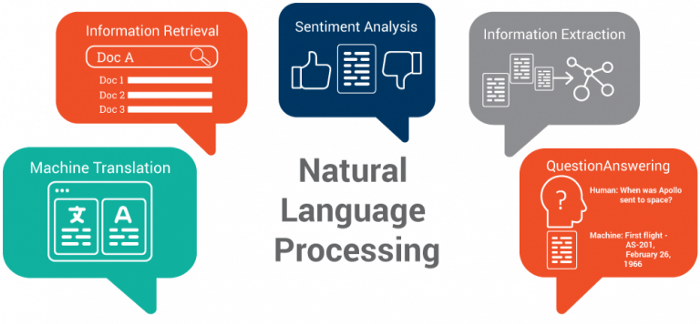Customer feedback, social media posts, emails, pop-ups etc. are creating great quantities of data. However, most of this is unstructured data.
If businesses want to extract actionable insights from text and voice-based inputs, it has to be collected, processed and analyzed. This is where natural language processing becomes necessary.
What is Natural Language Processing?
Natural Language Processing (NLP) is an AI method that makes use of algorithms to teach computers to use language like humans.

Understanding human language is difficult for computers because it is quite different from programming languages, but yet, there are many examples of well implemented NLP in common daily use.
It is messy, ambiguous and meaning is often dependent upon the context in which words are used. NLP is the technology that allows computers to understand human language.
Sentiment Analysis
One of the most important ways in which NLP is being used in business is sentiment analysis. Businesses need happy, loyal customers to be successful and it helps if they know what they are thinking about their products or services.
NLP enables retrieval and analysis of data and assigns value to help identify the emotion behind the words. Text is labeled as positive, neutral or negative but with advanced NLP, it is possible to identify mood – customers may be angry, happy or sad.
Knowing what they are feeling makes it possible for businesses to drive strategies and build campaigns that improve the way customer needs are addressed.
Chatbots
Chatbots are being used in many areas of business, including human resources. Companies are using chatbots to answer common employee questions regarding the amount of leave days they have left and others.
They poll employees on everything from what food they would like in the canteen to workplace satisfaction. They are also used in the recruiting process, engaging with prospective candidates and providing them with answers.
Chatbots are frequently being used to answer customer’s queries. They are available 24/7, don’t get tired or moody and respond to basic requests. When they are unable to answer queries, they direct them to those who can.
Intelligent Personal Assistants
Intelligent personal assistants can perform tasks or services on behalf of an individual. They use a natural language user interface and help answer and respond to queries.
These assistants can organize and maintain the information, including managing emails and keeping calendars up to date. They can set up appointments and schedule meetings, do research, translate, and perform various other tasks. Recognizing the intent of an inquiry is within their capabilities and they can personalize responses based on context.
Nina is an intelligent personal assistant that companies use for customer service. Conversations are intelligently automated with a human touch.
Nina understands almost everything a customer does and she can have a natural conversation with them because she can understand complex questions.
Cortana is Microsoft’s intelligent personal assistant that helps customers to work across devices and offers reminders to help them keep commitments. Siri, Lucida, Dragon Go, Vlingo and Amazon Echo are some other intelligent personal assistants.
Competitor & Industry Analysis
Every business needs to know what competitors are up to and how trends are affecting the industry it’s involved in.
Without this knowledge, it’s difficult to formulate effective marketing strategies. Information about competitors and industries are found in many different sources such as news articles, websites, infographics and market reports.
Sifting through all this information to gain the necessary insights is impossible without the use of NLP. It helps with analyzing all the information and extracting insights to allow effective, timely business decisions to be made.
Industry analysis is particularly important in financial markets and hedge funds usually use NLP to improve their models.
Conversational Search
The Second Mind is a voice-activated platform that listens in on company meetings. It identifies trigger phrases, such as “I wonder …” and goes into action to seek an answer. Say, for example, a board meeting is taking place and someone asks, “How many new customers did we gain last quarter?”
Second Mind will scan documents to find the answer and display it on a screen. Productivity improves when search can be streamlined during a real-time conversation. Microsoft and many other companies evidently have projects like Second Mind underway.
Effective Advertising
Presenting ads to the right eyeballs is very important because advertising budgets need to be spent as effectively as possible.
NLP allows for analysis of social media posts and much more data to find out more about customers, where they are hanging out and what they’re talking about.
Businesses can extract insights into customers that go beyond mere demographics, such as age and sex.
Emails, social media, browsing and purchasing behavior can contain plenty of information about what customers are really interested in and businesses can target the right customers in the right place.
What does the future hold?
Over the past few years, businesses have been starting to implement many promising NLP applications.
However, computers are not yet able to process or understand the text in the same way as humans. Most of the methods used in NLP are statistical, and they are only able to go a certain distance without semantics or context.
The algorithms behind the applications can simulate human understanding, but they can’t simulate behavior they haven’t seen before. The future will be about moving from natural language processing to natural language understanding
A Final Word
At present, NLP technologies are already providing businesses with many useful ways to make businesses more successful.
They can find out what customers are saying about their businesses, gain insights into competitor and industry trends and find out who is interested in their products.
They are also able to provide improved customer service with the use of chatbots and intelligent personal assistants and even use voice-activated programs in boardrooms to improve productivity.
Read Also:
- Top 10 Transformative Android Apps Development Trends in 2020
- How Artificial Intelligence Transforms Talent Acquisition and Management
- Artificial Intelligence: Where are we going?
Author Bio: Edward Huskin
















